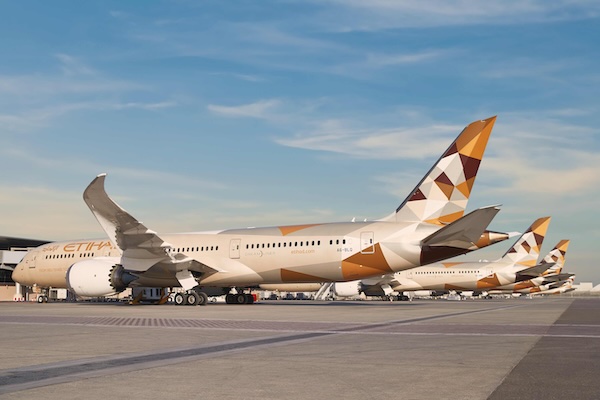Etihad Airways reported a remarkable increase in its annual profits for 2023, driven by strategic restructuring and operational optimisation.
The airline experienced a 40% surge in passenger numbers, resulting in substantial revenue growth and reflecting strong demand across its network.
Strategic Restructuring Drives Profitability
Etihad Airways has successfully implemented a strategic restructuring plan that significantly boosted its annual profits for the year 2023. The airline’s net profit surged to $143 million, up from $25 million in the previous year, primarily attributed to a 40% increase in passenger numbers, reaching 14 million travellers. Furthermore, passenger revenue experienced a substantial hike, increasing by $1.1 billion to a total of $4.5 billion, as demand for air travel remained robust across the airline’s expanding network.
The restructuring focused on essential areas such as fleet optimisation and route rationalisation, which played a critical role in enhancing operational efficiency. Etihad’s ability to maintain a high load factor of 86% also indicates effective capacity management and a strong market position. The focus on enhancing the core airline offering, alongside divestment of ancillary support services, helped streamline operations and cut unnecessary expenses.
Fleet Expansion and Network Growth
Etihad Airways’ capacity increased by 30% in 2023, facilitated by the addition of 14 new aircraft and 15 new destinations to its network, which now encompasses 72 locations globally. Key new destinations added include Lisbon, Copenhagen, Kolkata, and Osaka, expanding Etihad’s reach from its Abu Dhabi hub.
The airline’s expanding network and modern fleet emphasise its commitment to strengthening market presence while supporting Abu Dhabi’s tourism goals. This network expansion is pivotal in driving passenger growth as new routes open up numerous opportunities for travellers seeking diverse destinations and efficient connections.
Operational Efficiency and Environmental Impact
Etihad Airways is committed to operating a highly efficient fleet, with 78% of its passenger aircraft comprising next-generation models.
These advancements contribute significantly to the airline’s operational efficiency and are instrumental in achieving reduced emission targets, aligning with global trends towards more sustainable aviation practices.
By employing technologically advanced aircraft, Etihad not only enhances its fuel efficiency but also reduces its carbon footprint. This strategy not only supports environmental sustainability but also ensures the airline remains competitive in an increasingly eco-conscious market.
Financial Health and Strategic Investments
The airline’s financial health is robust, bolstered by strong cash-flow generation and controlled operational expenditures. This has enabled Etihad to reduce its net debt, solidifying its balance sheet and providing a stable foundation for future growth.
Strategic investments in technology and innovative solutions continue to enhance Etihad’s operational capabilities, resulting in improved service delivery and customer satisfaction. The company’s prudent financial management ensures it is well-placed to pursue further growth opportunities while maintaining financial stability.
Etihad’s commitment to fiscal responsibility is reflected in its capacity to invest in advanced technologies that optimise operations and improve customer experiences.
Such financial prudence and strategic foresight are key to sustaining growth momentum and enhancing shareholder value in a competitive industry environment.
Leadership Vision and Future Prospects
Etihad’s leadership, under the guidance of Chairman Mohammed Ali Al Shorafa and CEO Antonoaldo Neves, remains focused on driving the company’s strategic vision forward. Al Shorafa stated, “I am confident we will continue to build on this solid foundation as we grow our network, enhance our offering and connect even more people with Abu Dhabi.”
CEO Antonoaldo Neves added that the airline’s future growth strategy includes pursuing further margin expansion opportunities and delivering extraordinary customer experiences, all while adhering to the shareholder’s mandate of financial viability.
The leadership aims to establish Etihad as the preferred choice for travellers worldwide by continuously refining its network and service offerings to meet evolving market demands.
Market Position and Competitive Edge
Etihad Airways has positioned itself as a strong competitor in the global aviation market, leveraging its strategic location within the UAE and extensive network reach.
The airline’s focus on customer experience and operational excellence differentiates it from its peers, providing a distinct competitive edge. Such commitment to quality service ensures that passenger growth is not only sustained but continues to thrive amidst the dynamic aviation landscape.
The airline’s comprehensive approach to enhancing its services and expanding its network affirms its ongoing commitment to achieving a significant market presence, thereby solidifying its reputation as an industry leader.
Challenges and Opportunities
While Etihad Airways faces challenges typical of the aviation sector, including fluctuating fuel prices and geopolitical uncertainties, the airline continues to identify and capitalise on growth opportunities.
By harnessing cutting-edge technology and focusing on operational efficiency, Etihad is well-equipped to navigate these challenges and enhance its value proposition to customers.
Etihad Airways’ strategic restructuring and focus on operational efficiency have significantly enhanced its financial performance. With strong leadership and a commitment to sustainable practices, the airline is well-positioned to continue its growth trajectory and maintain profitability in the competitive aviation landscape.

